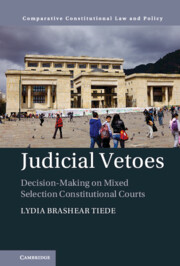Book contents
- Judicial Vetoes
- Comparative Constitutional Law and Policy
- Judicial Vetoes
- Copyright page
- Dedication
- Contents
- Figures
- Tables
- Acknowledgments
- 1 Introduction
- 2 The Implications of Mixed Judicial Selection on Decision-Making
- 3 Mixed Judicial Selection
- 4 The Chilean Constitutional Tribunal in Political Context
- 5 The Colombian Constitutional Court in Political Context
- 6 Determinants of Legal Invalidation by Constitutional Judges
- 7 Determinants of Legal Invalidation by Constitutional Courts
- 8 Weak Judicial Vetoes and Contentious Politics
- 9 Conclusion
- Appendices
- References
- Index
2 - The Implications of Mixed Judicial Selection on Decision-Making
Published online by Cambridge University Press: 22 July 2022
- Judicial Vetoes
- Comparative Constitutional Law and Policy
- Judicial Vetoes
- Copyright page
- Dedication
- Contents
- Figures
- Tables
- Acknowledgments
- 1 Introduction
- 2 The Implications of Mixed Judicial Selection on Decision-Making
- 3 Mixed Judicial Selection
- 4 The Chilean Constitutional Tribunal in Political Context
- 5 The Colombian Constitutional Court in Political Context
- 6 Determinants of Legal Invalidation by Constitutional Judges
- 7 Determinants of Legal Invalidation by Constitutional Courts
- 8 Weak Judicial Vetoes and Contentious Politics
- 9 Conclusion
- Appendices
- References
- Index
Summary
This chapter sets the stage for the research endeavor by providing the main research questions and puzzles that the book addresses. The theory briefly described in the introduction, but detailed in the subsequent chapters, explains the relationship between judicial selection, judges’ individual choices and the decisions of the court as a whole.
- Type
- Chapter
- Information
- Judicial VetoesDecision-making on Mixed Selection Constitutional Courts, pp. 16 - 45Publisher: Cambridge University PressPrint publication year: 2022

